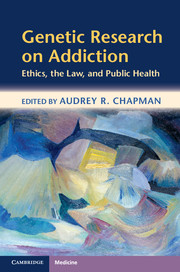Book contents
- Frontmatter
- Contents
- Contributors
- Preface
- Section 1 Introduction
- 1 Introduction to the volume
- 2 The implications of genetic research on alcohol dependence for prevention and treatment
- 3 Promises and risks for participants in studies of genetic risk for alcohol or drug dependence
- Section 2 Research ethics
- Section 3 Translating addiction research
- Section 4 Conclusions
- Index
- References
1 - Introduction to the volume
from Section 1 - Introduction
Published online by Cambridge University Press: 05 September 2012
- Frontmatter
- Contents
- Contributors
- Preface
- Section 1 Introduction
- 1 Introduction to the volume
- 2 The implications of genetic research on alcohol dependence for prevention and treatment
- 3 Promises and risks for participants in studies of genetic risk for alcohol or drug dependence
- Section 2 Research ethics
- Section 3 Translating addiction research
- Section 4 Conclusions
- Index
- References
Summary
The misuse of alcohol and illicit drugs inflicts a major toll on individual users, their families, and the wider society. Addictive disorders contribute to excess morbidity and mortality and are economically costly. They also disproportionately affect people in the prime of life (Merikangas and Risch, 2003). The World Health Organization (WHO) divides the adverse effects of alcohol, opioids, and other psychoactive substances into four categories: chronic health effects (such as the toxic effect of alcohol in producing liver cirrhosis); the acute or short-term biological health effects of the substance (such as the effects of drug and alcohol overdose); the adverse social consequences of substance use (such as criminal activity to obtain access); and chronic social problems (such as the impact on family life) (WHO, 2004: 10–11). In addition, alcohol and drug consumption is associated with widespread psychosocial consequences, including violence, absenteeism in the workplace, and child neglect and abuse (WHO, 2011: 24). WHO estimates that alcohol ranks eighth among global risk factors for death and is the third leading global risk factor for disease and disability (WHO, 2011: 34). Of the ten leading risk factors of avoidable burden of ill-health, tobacco was fourth and alcohol fifth in 2000 (WHO, 2004: 16–17). Alcohol-related disability is a condition that affects more than 12% of the population in the United States at some point in their life. The majority of individuals with alcohol dependence (AD) – about three-quarters – never receive treatment (Heilig et al., 2011: 670–671).
Dependence on psychoactive substances has long been thought to have a biological basis, as suggested by observations of its prevalence in some families. The breaking of the genetic code in the 1960s and the inception of the Human Genome Project to sequence the human genome in 1990 have spurred efforts to identify the genetic basis of predispositions to drug and alcohol dependence. Given the high costs and difficulties in successfully treating addiction (Sellman, 2009), there has been interest in discovering more effective approaches to treatment. It has been thought that a better understanding of the genetic contribution of addiction could lead to more effective drugs to assist in cessation of drug use with fewer adverse side effects. Relatedly, it is assumed that genotyping could also better match patients to existing pharmacological treatments for addiction (Hall et al., 2002: 1482). This volume briefly describes such scientific research as well as current progress in identifying the genetic contributions to AD and other forms of addiction.
- Type
- Chapter
- Information
- Genetic Research on AddictionEthics, the Law, and Public Health, pp. 1 - 15Publisher: Cambridge University PressPrint publication year: 2012



